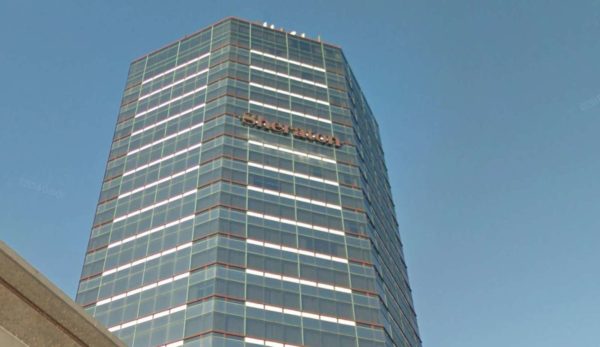
Let speculation about the future of the Sheraton Tysons Hotel begin, as the conclusion of a tax dispute that ended up in court could allow the property to move forward.
The Fairfax County Board of Supervisors agreed to accept a settlement agreement following a closed-door meeting on Tuesday (Dec. 7) to resolve lawsuits filed by the owner of the 449-room hotel (8661 Leesburg Pike), which permanently closed in April 2020.
Constructed in the mid-1980s, the Sheraton was one of a handful of union-run hotels in the Commonwealth, which contributed to higher operating costs, including for employee benefits.
Sheraton property owner JBG Smith, a Maryland-based real estate development and investment firm, filed lawsuits against Fairfax County in 2019 and 2020, contesting years-old property tax assessments.
The company’s lawyers argued that the county’s mass appraisal process failed to take the site’s higher operating costs into account. The suits had been headed for trials in 2022.
The county declined to comment on whether it has changed any appraisal policies or procedures due to the error. Board of Supervisors Chairman Jeff McKay’s office deferred questions to a county attorney, who cited a tax law, arguing settlement details couldn’t be released due to confidentiality.
The county also said the matter “remains in litigation.” The county suggested yesterday (Thursday) that the property’s assessments in 2016 and 2017 would be modified.
A county property database has stated the owner’s annual real estate taxes were around $252,092 for 2021.
Court records indicate that JBG Smith, identified as JBG Tysons Hotel LLC, sought compensation between $100,000 and $500,000 for each case.
Crescent Hotels & Resorts, which managed the Sheraton, issued a layoff notice for 171 workers, effective April 3, 2020, as the COVID-19 pandemic rocked the U.S. hospitality industry. Later that year, the hotel launched a liquidation sale of furniture and other items.
John Boardman, a representative for Unite Here Local 25, a union for D.C. area hospitality workers, said employees received closing pay as part of their now-expired collective bargaining agreement around six months ago.
“Our contract also provides that if all or part of the property is reopened as a hotel operation, then individuals who were formerly employed have a right to return to work in their previously held jobs,” Boardman said, adding that while the contract is no longer in force, the return-to-work provision runs in perpetuity.
The former Sheraton building occupies 5.8 acres of prime real estate off of Route 7 in Tysons West. JBG Smith has not publicly shared its future plans for the site, but rising property values could make it ripe for redevelopment.
Photo via Google Maps

Hospitality workers looking to return to their jobs and hotels trying to recover from the COVID-19 pandemic are seeing signs of progress in an industry wrecked by shutdown orders and travel disruptions.
Fairfax County’s new PIVOT grant program is prioritizing grant money for hotels, while also assisting other hard-hit businesses with $25 million in federal COVID-19 relief money. The program received 581 fully completed applications — including 15 in the lodging category — on Wednesday (June 23), its first day accepting applications.
Applications will be accepted through July 9, and the order they are received has no bearing on priority. But if funds are limited, lodging businesses with at least 10 rooms will be addressed first before a lottery then determines which companies in need will get money.
Inns of Virginia Falls Church Manager Michael Riddlemoser said he was unaware of the PIVOT grant or whether his company is applying for the money but felt it could be useful to try. He said his 32-room hotel is around 50% full, down from 75 to 80% before March 2020.
While some travelers come specifically for Tysons or business in Virginia, declining travel to D.C. has been a blow to Riddlemoser’s lodging business. As hotels in Washington fill up, it brings a trickle-down effect that boosts locations like his.
“We just need more people coming into town,” he said. “D.C. [needs] to get full for us to start getting the D.C. business.”
Managers at nearby hotels also reported being around half capacity. One said many furloughed staff are inquiring about when they can return, and three wedding parties stayed there recently.
A study commissioned by the Tysons Partnership found that the region’s hotel business could rebound by 2025.
“The COVID-19 pandemic that has devastated the hospitality sector has not spared Tysons hotels, which have seen revenues drop by 64%,” the study said. “Still, this is a modest decline relative to major regional competitors.”
The study noted that Tysons is expected to add another 478 hotel rooms this year with the completion of The Archer in Scotts Run and the Watermark in Capital One Center. Those new hotels say they’ll open in late summer and October, respectively.
The leisure and hospitality sector has lost 3.1 million jobs during the pandemic, representing over a third of all unemployment in the U.S., according to an American Hotel & Lodging Association report from February.
The report said the industry lost over 17,000 jobs in Virginia last year and was projected to lose over 13,000 jobs this year.
UNITE HERE Local 25, which represents about 7,200 hospitality workers across the DC region, had only 2% of members working last July, but the employment rate has bounced back to 25% in Northern Virginia, according to Benjy Cannon, the union’s director of communications.
Cannon attributes recent gains over the last eight weeks to vaccinations and domestic travel.
But the union believes pre-pandemic occupancy levels won’t return until international travel and long-term business travel returns, Cannon said. With unemployment benefits set to expire in September, that could lead the group to press legislators for changes.
“By late 2023, 2024, the industry is slated to recover stronger than it was in 2019,” Cannon said. “So, while this is an unfortunate bump in the road and our members are certainly mourning over it, we do still think that this region, this market, can recover in a really robust fashion and expect it to, even if it’s still a few years away.”
Photo via Febrian Zakaria on Unsplash

